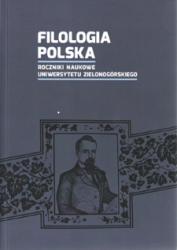Sienkiewicz – interpretative disputes (up to the jubilee year 1900)
Keywords
Abstract
Almost at the beginning of Sienkiewicz’s career he was thought to be a controversial writer. First controversy appeared in connection with a story entitled Charcoal Sketches [Szkice węglem] and their fundamental assumptions. Author himself was sure the reaction would be strong but he did not excpect it from positivist critics. Nevertheless, the attack published in “Weekly Review” [„Przegląd Tygodniowy”] met not only Bolesław Prus’ but also Aleksander Świętochowski’s objections. Such an attitude of the latter towards Sketches encouraged Sienkiewicz to another project – writing a series of a similar pamphlet tone, but he resigned from this idea. Next dispute – much broader – aroused because of issuing the first historical novel With Fire and Sword [Ogniem i mieczem] by Sienkiewicz. The debate revealed distinctly contrary opinions between ideological wings – conservatist and positivist ones. Two great debates came out: by Stanisław Tarnowski and Bolesław Prus. As a matter of fact this dispute expressed the essential differences of views on the Sienkiewcz’s masterpiece and formed a stereotype in a process of his output evaluation, which the later critics first of all refered to. Since that time the extreme poles of the attitude towards Sienkiewicz have fluctuated from worship to anathema. The novelist himself attempted to neutralize any controvercies by specyfying his ideological-artistic position as antidoctrinal one (in a letter to Stanisław Witkiewicz). Another controversy was marked at the beginning of XX century, during the jubilee of Sienkiewicz’s 25 years writing activity celebration and also afterwards. In the “Voice” [“Głos”], the first opinions criticizing the whole of Sienkiewicz’s works appeared. Stanisław Brzozowski’s essays became the most famous. Completely different notes were presented by Sienkiewicz’s admirers with Józefat Nowiński at the head. Why did Sinkiewicz stimulate his adherents? What aroused criticism and, on the other hand, apotheosis? One of the most important problems seems to be Sienkiewicz’s impact on identity precesses. As Józef Chałasiński claimed, Sienkiewicz created a stable nobility ethos of Polish inteligentsia. Therefore, the dispute about the writer is a dispute over the genealogy of Polish intelligentsia and the vision of the national past. However, there is one more question – does it correspond with images beeing evoked by the works of the writer?
References
LITERATURA CYTOWANA
Alf Omega, Listy pustelnika z Chmielnej ulicy, „Echo” 1877, nr 81.
[Google Scholar]
Baronowa XYZ, Towarzystwo Warszawskie. Listy do przyjaciółki, t. 2, Kraków 1887.
[Google Scholar]
Brzozowski S., I smutek tego wszystkiego…, Henryk Sienkiewicz i jego stanowisko w literaturze współczesnej, Współczesna powieść polska [w:] idem, Eseje i studia o literaturze, wybór, wstęp i oprac. H. Markiewicz, t. 1, BN I, nr 258, Wrocław1990.
[Google Scholar]
Brzozowski S., Współczesna powieść polska, Stanisławów 1906.
[Google Scholar]
Bujnicki T., Pozytywista Sienkiewicz. Linie rozwojowe pisarstwa autora „Rodziny Połanieckich”, Kraków 2007.
[Google Scholar]
Bujnicki T., Szkice, których nie było, [w:] Sienkiewicz z innej strony, red. J. Axer, T. Bujnicki, Warszawa 2015.
[Google Scholar]
Chałasiński J., Społeczna genealogia inteligencji polskiej, Warszawa 1946.
[Google Scholar]
Chmielowski P., Pisma krytycznoliterackie, oprac. H. Markiewicz, t. 1, Warszawa 1961.
[Google Scholar]
Chmielowski P., Zarys najnowszej literatury polskiej (1864-1897), Kraków-Petersburg 1898.
[Google Scholar]
Echa warszawskie, „Przegląd Tygodniowy” 1877, nr 4.
[Google Scholar]
Falkowski Z., Przede wszystkim Sienkiewicz, Warszawa 1959.
[Google Scholar]
Hendzel W., „Piękna, szumna, polotna i jaskrawa legenda”. Twórczość Henryka Sienkiewicza w publicystyce literackiej warszawskiego „Głosu” [w:] Złota księga. Ścieżkami współczesnego literaturoznawstwa i językoznawstwa, red. S. Gajda, Opole 2001.
[Google Scholar]
Kronika miesięczna, „Ateneum” 1879, t. 2.
[Google Scholar]
Nałkowski W., Sienkiewicziana, [w:] idem, Pisma społeczne, Warszawa 1951.
[Google Scholar]
Nowiński J., Sienkiewicz, Warszawa 1901.
[Google Scholar]
Papée S., Sienkiewicz wielki czy mały?, Kraków 1948.
[Google Scholar]
Prus B., „Ogniem i mieczem” – powieść z lat dawnych Henryka Sienkiewicza, „Kraj” 1884.
[Google Scholar]
Prus B., Kronika miesięczna, „Ateneum” 1877, t. 2.
[Google Scholar]
Przegląd literatury. „Szkice węglem” Litwosa, „Przegląd Tygodniowy” 1877, nr 10.
[Google Scholar]
Sienkiewicz H., Listy, t. 1, cz. 2, oprac. J. Krzyżanowski, M. Bokszczanin, Warszawa 1977; Listy, t. 3, cz. 1, oprac. M. Bokszczanin, Warszawa 2007; Listy, t. 3, cz. 2, oprac. M. Bokszczanin, Warszawa 2007; Listy, t. 5, cz. 2, oprac. M. Bokszczanin, Warszawa 2009.
[Google Scholar]
Sienkiewicz H., Mieszaniny literacko-artystyczne, Dzieła, wydanie zbiorowe pod red. J. Krzyżanowskiego, t. 50, Warszawa 1950.
[Google Scholar]
Sztachelska J., Zabijanie klasyków, Białystok 2015.
[Google Scholar]
Szweykowski Z., „Ogniem i mieczem” a krytyka pozytywistyczna, [w:] idem, Trylogia Sienkiewicza i inne szkice o twórczości pisarza, Poznań 1973, s. 107.
[Google Scholar]
Świętochowski A., Henryk Sienkiewicz (Litwos), „Prawda” 1884.
[Google Scholar]
Świętochowski A., Wybór pism krytycznoliterackich, wyb. S. Sandler, wstęp i przypisy M. Brykalska, Warszawa 1973.
[Google Scholar]
Tarnowski S., Z najnowszych powieści polskich [I]. Cytat za: idem, O literaturze polskiej XIX wieku, wyb. i oprac. H. Markiewicz, Warszawa 1977, s. 699.
[Google Scholar]
Tarnowski S., Z najnowszych powieści polskich [II]. Henryka Sienkiewicza „Ogniem i mieczem”, [w:] idem, O literaturze polskiej XIX wieku, s. 773-774.
[Google Scholar]
Trylogia Henryka Sienkiewicza. Studia, szkice, polemiki, oprac. T. Jodełka, Warszawa 1962.
[Google Scholar]
Witkiewicz S., Juliusz Kossak, Lwów 1906.
[Google Scholar]
Wyka K., O sztuce pisarskiej Sienkiewicza, [w:] Henryk Sienkiewicz. Twórczość i recepcja światowa, red. K. Wyka, M. Rydlowa, Kraków 1968.
[Google Scholar]
Preview
Downloads
Published
How to Cite
Issue
Section
Categories
Copyright & License

This work is licensed under a Creative Commons Attribution-NonCommercial-NoDerivatives 4.0 International License.
Copyrights (a). In principle, authors who are not employed by the University of Zielona Góra retain the copyright, including publishing rights to the articles, without restrictions.
Copyrights (b). In principle, authors who are employed by the University of Zielona Góra, do not retain the copyright, including publishing rights to the articles. In such cases the copyright holder is the University of Zielona Góra.
Print ISSN
2450-3584-
Abstract156










































